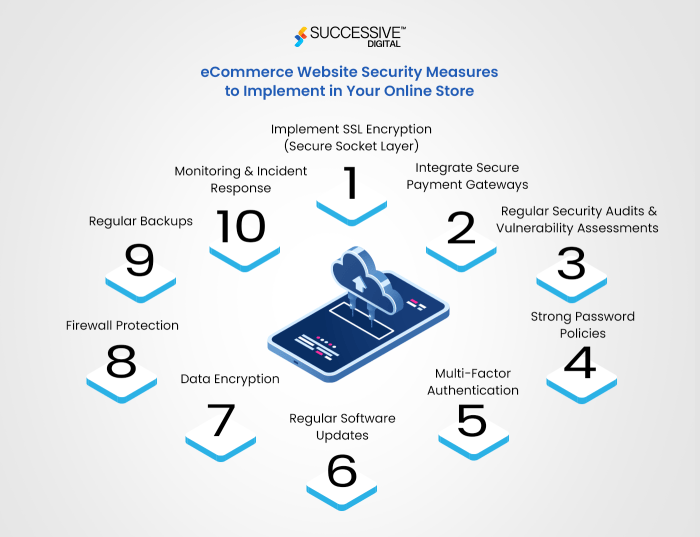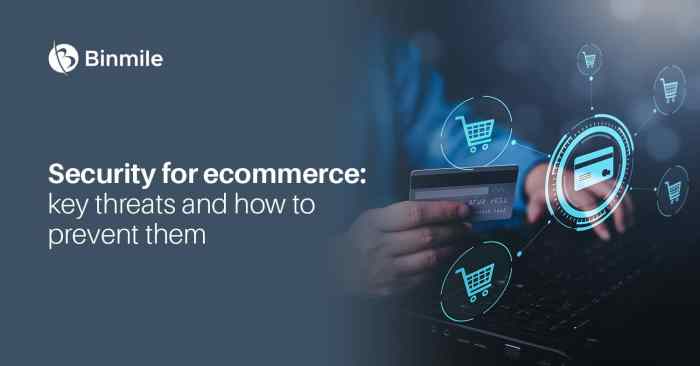Why ecommerce security matters for your business sets the stage for this enthralling narrative, offering readers a glimpse into a story that is rich in detail and brimming with originality from the outset. In today's digital landscape, safeguarding customer data in online transactions is paramount for businesses.
Security breaches not only jeopardize customer trust but also damage brand reputation. Let's dive into the world of ecommerce security and explore why it's a crucial aspect for any business operating online.
Importance of Ecommerce Security

Ensuring ecommerce security is essential for protecting customer data during online transactions. With the rise of cyber threats, safeguarding sensitive information such as credit card details and personal data is crucial to maintaining trust and credibility.
Impact of Security Breaches on Customer Trust and Brand Reputation
Security breaches can have severe consequences on customer trust and brand reputation. When a company fails to protect customer data, it not only leads to financial losses but also damages the trust customers have in the brand. Customers may be hesitant to make future purchases, resulting in a loss of revenue and a tarnished reputation.
- One example of a company that suffered from a security breach is Target. In 2013, Target experienced a massive data breach where hackers stole credit card information from over 40 million customers. The breach not only cost Target millions of dollars in lawsuits and settlements but also significantly impacted customer trust and loyalty.
- Another notable case is the security breach faced by Equifax in 2017. The breach exposed the personal information of 147 million people, including social security numbers and birthdates. This incident not only led to legal repercussions for Equifax but also severely damaged its reputation as a trusted credit reporting agency.
Common Ecommerce Security Threats
When it comes to running an ecommerce business, it is crucial to be aware of the common cyber threats that can jeopardize the security of your online store. Hackers are constantly evolving their tactics to breach security measures and gain unauthorized access to sensitive data.
Phishing Attacks
Phishing attacks involve fraudulent attempts to obtain sensitive information such as usernames, passwords, and credit card details by disguising as a trustworthy entity in electronic communication. Hackers often use phishing emails or fake websites to deceive unsuspecting users into revealing their confidential information.
Malware
Malware refers to malicious software designed to disrupt, damage, or gain unauthorized access to computer systems. In the context of ecommerce, malware can be injected into a website to steal customer data, financial information, or to gain control over the website itself.
It can be spread through infected links, downloads, or attachments.
DDoS Attacks
Distributed Denial of Service (DDoS) attacks aim to overwhelm a website's server with a flood of traffic, rendering the website inaccessible to legitimate users. Ecommerce businesses are often targeted by DDoS attacks, causing downtime, loss of revenue, and damage to the brand's reputation.
Hackers may demand ransom to stop the attack or use it as a distraction to carry out other malicious activities.
Strategies for Enhancing Ecommerce Security
When it comes to securing an ecommerce website, there are several best practices that businesses can implement to protect their customers' information and maintain a secure online environment. One of the key strategies is to use encryption to safeguard sensitive data, while another effective method is implementing multi-factor authentication to add an extra layer of security.
Importance of Using Encryption
Encryption plays a crucial role in ecommerce security by encoding sensitive information such as credit card details, personal data, and passwords
Implementing Multi-Factor Authentication
Multi-factor authentication is a security method that requires users to provide two or more forms of identification before accessing an account. This could involve entering a password, receiving a code on their mobile device, or using biometric verification. By adding this extra layer of security, businesses can significantly reduce the risk of unauthorized access and protect sensitive data from potential breaches.
Compliance and Regulations
Compliance with regulatory requirements is crucial for ecommerce businesses to ensure the security of sensitive data and maintain trust with customers. Failure to follow industry regulations related to data protection can have serious consequences, including financial penalties, loss of reputation, and legal action.
Regulatory Requirements for Ecommerce Businesses
- Ecommerce businesses need to comply with regulations such as the General Data Protection Regulation (GDPR) in Europe, the California Consumer Privacy Act (CCPA) in the United States, and other data protection laws specific to the regions they operate in.
- These regulations require businesses to implement measures to protect customer data, obtain consent for data collection and processing, and notify individuals in case of data breaches.
- Non-compliance with these regulations can result in hefty fines, lawsuits, and damage to the company's reputation.
Implications of Non-Compliance
- Failure to adhere to industry regulations related to data protection can lead to data breaches, identity theft, and financial losses for both businesses and customers.
- Customers are more likely to trust businesses that prioritize data security and comply with regulations, leading to better customer loyalty and increased sales.
- Non-compliance can also result in legal consequences, negative publicity, and a damaged brand reputation.
Importance of Adhering to Standards like PCI DSS
- Payment Card Industry Data Security Standard (PCI DSS) is a set of security standards designed to ensure that all companies that accept, process, store, or transmit credit card information maintain a secure environment.
- Adhering to PCI DSS requirements can help ecommerce businesses protect sensitive payment card data, reduce the risk of data breaches, and build trust with customers.
- By implementing PCI DSS compliance measures, businesses can demonstrate their commitment to data security and safeguard against potential cyber threats.
Summary

As we conclude our discussion on why ecommerce security matters for your business, it's evident that prioritizing security measures is non-negotiable in the realm of online commerce. By implementing robust security strategies, complying with regulations, and staying vigilant against cyber threats, businesses can safeguard their operations and build trust with their customers.
Stay informed, stay secure, and thrive in the digital marketplace.
Essential Questionnaire
What are some common types of cyber threats that target ecommerce businesses?
Common cyber threats include phishing attacks, malware infections, DDoS attacks, and data breaches targeting customer information stored by ecommerce platforms.
How can encryption enhance ecommerce security?
Encryption plays a vital role in protecting sensitive customer data during online transactions by encoding information, making it unreadable to unauthorized parties.
Why is multi-factor authentication important for ecommerce security?
Multi-factor authentication adds an extra layer of security by requiring users to provide multiple forms of verification before accessing sensitive data or making transactions, reducing the risk of unauthorized access.

